As the travel & hospitality market limps into the new year, battered by the end-of-year surge in labor shortages due to the Omicron variant of COVID-19, it is clear that contactless technologies will continue to be widely adopted as the industry seeks to limit person-to-person contact and searches for more efficiencies.
The new Dash Research report, CX in the Travel & Hospitality Industry, explores the acceleration of contactless and convenience technologies as one of the drivers in the CX market. The implementation of contactless technologies was already in the works before COVID-19, but the pandemic greatly accelerated the rollout. Contact-free hotel technologies and other convenience solutions, such as those targeted to line management and passenger tracking, have been rapidly trialed and implemented. However, the contactless movement has resulted in an explosion of other innovations being applied to the travel & hospitality market, including robots and biometrics.

Robots have been implemented in airports for a variety of reasons in the past, such as providing flight information, directions, cleaning and disinfection, or security. Since COVID-19, delivery is another option that airports are exploring. A fleet of Ottobots from Ottonomy are now available at the Cincinnati/Northern Kentucky International Airport to deliver food, beverages, and lifestyle products throughout the airport, eliminating the need to wait in line or have personal contact. Gita robots from Piaggio Fast Forward are being used for a similar purpose at the Philadelphia International Airport.
The need for fast, contactless identification across a travel journey is resulting in biometrics a lot of buzz in the travel market. Biometrics uses physical characteristics to identify individuals. This can include facial recognition, voice recognition, iris recognition, and fingerprint scanning. Trials and implementations have been launched both by government agencies and other travel-related entities. The Transportation Security Administration (TSA) is testing facial identification and the US Customs and Border Protection is investing in technologies to be used for cruise travel. Star Alliance Biometrics launched in 2020 and allows travelers to have a contactless journey throughout an airport, allowing passengers to go through each contact point from check-in to the gate using a secure identity management solution with facial recognition. This results in a reduction in physically handling paperwork and less personal contact. Biometrics is not only being used to smooth out air travel, but is also being used for train travel, with the Eurostar and iProov trial of the SmartCheck service in London’s St Pancras station serving as one example. Aside from being used to ensure ID requirements as passengers move through various checkpoints, biometrics is also being used to enable contact-free payment. An interesting implementation was recently announced by the ubiquitous travel retailer Hudson. Hudson is using Amazon’s palm recognition system (Amazon One) after travelers are through security at a certain location within the Dallas Love Field Airport. The Hudson Nonstop store will allow travelers to pay in the traditional way or hover their palm over the Amazon One device at the entrance to the store.
These contact-free ID technologies will become even more important as international travelers face requirements for increased documentation and procedures due to the pandemic, particularly when moving through customs and immigration. As travel & hospitality companies look for ways to deploy their decreased labor force in a more efficient manner and as passengers are looking for ways to more safely travel during the pandemic, these technology types will enhance a customer’s travel experience during some of the more stressful touchpoints in their journey, allowing for a more socially distanced and pleasant experience.
Author Information
As a detail-oriented researcher, Sherril is expert at discovering, gathering and compiling industry and market data to create clear, actionable market and competitive intelligence. With deep experience in market analysis and segmentation she is a consummate collaborator with strong communication skills adept at supporting and forming relationships with cross-functional teams in all levels of organizations.
Sherril holds a Master of Business Administration in Marketing from University of Colorado, Boulder and a Bachelor of Arts in Psychology from Rutgers University.








